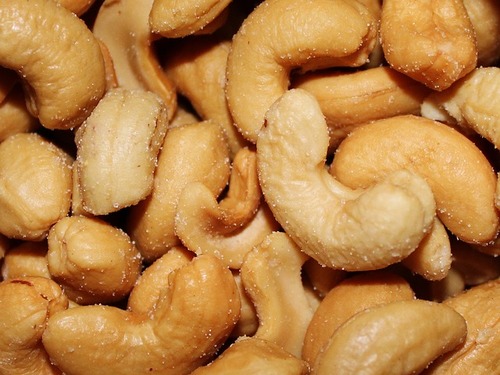Are Cashews Bad For You?
Also Known As: cashew seeds
Short answer
Cashews are power nuts. Cashews are packed with various vitamins, minerals, and antioxidants. Still, like anything else consumption must be done in moderation. Allergic reactions, weight gain, and high blood pressure are some possible negative side effects of overindulgence.
Recommended Alternative
Very healthy and numerous health benefits. Harmful qualities may be associated, but aren't usually serious.
View Full Grading System
Category 'A'
Very healthy and numerous health benefits. Side effects are rare. Things rated an 'A+' are typically necessary for survival (for example, water).
Very healthy and numerous health benefits. A few harmful qualities may be associated, but only under certain circumstances such as an allergic reaction.
Very healthy and numerous health benefits. Harmful qualities may be associated, but aren't usually serious.
It is important to note that even the best things in life can become bad in immoderate amounts. So, although something may be rated an 'A+', overconsumption/overdoing can bring unwanted effects.
Category 'B'
Very beneficial to your health. Things rated a 'B+' may have a few harmful qualities to pay attention to.
Overall beneficial to your health. Things rated a 'B' may have some harmful qualities to pay attention to.
More beneficial to your health than not. However, harmful qualities are most likely associated and shouldn't be overlooked.
The main difference between category 'A' and category 'B' is the harmful qualities typically present in 'B' items. Serious side effects are usually uncommon, but are still possible and should be taken note of.
Category 'C'
Both beneficial and harmful qualities associated. Things rated a 'C+' are typically a bit more on the beneficial side. Still, moderation is important.
A fairly even ratio of beneficial and harmful qualities. Moderation is important. Very general topics that can lean towards both sides of the spectrum will be placed here as well. Rice, for example, can be good or bad depending on the type.
More harmful than beneficial. Side effects are common, especially when consumed/done excessively. Moderation is very important.
Category 'C' usually denotes to both good and bad qualities. When it comes to this category, it is important to keep this word in mind: moderation.
Category 'D'
Harmful to your health. Although benefits may be associated, the bad most likely outweighs the good. Moderation is very important.
Harmful to your health. A few benefits may be associated, but the bad outweighs the good. Moderation is extremely important.
Harmful to your health. Very few, if any, benefits are present. Things in this category should be avoided as much as possible.
Category 'D' is typically for things that are more harmful than beneficial. While consuming/doing something unhealthy once in a blue moon shouldn't hurt, we definitely recommend eliminating 'D' items as a regular part of your routine/diet.
Category 'F'
Category 'F' is for things that fail to bring anything beneficial to the table, and are very harmful to your health. We recommend completely avoiding anything in this category. Long-term side effects of 'F' items are usually very serious.
Category 'N'
'N' stands for neutral. Things placed into this category are generally (a) neither good nor bad for you, or (b) lack the necessary evidence to reach any conclusions.
Long answer
Heart Healthy: Research has shown that cashews are good for lowering your risks for cardiovascular disease, as they are full of heart healthy fats. Cashew consumption can help reduce cholesterol levels since cashews are cholesterol-free. Cashew consumption also helps to reduce blood pressure levels, as well as aid in digestion. Other vitamins and minerals in cashews include potassium, folic acid, vitamins E, K, and B6, along with minerals like copper, phosphorus, zinc, magnesium, iron, and selenium - all of which are important for maintaining healthy bodily functions.
Vision 20/20: For healthy eyes, people tend to think of carrots. Cashews, though, are filled with high levels of Lutein and Zeaxanthin. These act as antioxidants when consumed regularly and help to reduce the chance of developing cataracts. They can even help to protect the eyes from light damage which could lead to blindness later down the road.
Moderation: As is advised with every endeavor, especially eating, moderation is important. Too many cashews can increase blood pressure. An adult needs 1500mg of Sodium daily, not exceeding 2300mg. A single ounce of cashews contains 50mg of sodium if they are unsalted. The same dose if salted contains around 870mg. Therefore, it is important to watch sodium intake if eating salted cashews. Excess sodium can lead to high blood pressure, stroke, heart disease and even kidney disease.
Allergies: With the growing enthusiasm for cashews there is a great concern about allergic reactions, especially for children who may not have been previously introduced to cashews. According to a recent study, cashew allergies are one of the most common food allergies. Allergic reactions to cashews are very serious, as it can constrict the airways. Be sure to seek medical attention immediately should you begin to experience a reaction after consumption.
Possible short-term side effects
- allergic reaction
-
headaches
Possible long-term side effects
- increased blood pressure
-
weight gain
Ingredients to be aware of
Benefits
- great source of vitamins
-
great source of minerals
-
decreases cholesterol
-
decreases risk of heart disease
-
decreases blood pressure
-
promotes eye health
-
promotes dna synthesis
-
aids digestion
Our Wellness Pick
(what is this?)
Terrasoul Cashews
- Organic raw cashews
- Non-GMO
- Rich in nutrients
- Whole 2lb bag
Learn More!
Please turn your Ad Blocker off to see this content. Thank you!
Thank you for your feedback!
Written by Healthy Living 35
Published on: 12-28-2015
Last updated: 12-15-2023
Thank you for your feedback!
Written by Healthy Living 35
Published on: 12-28-2015
Last updated: 12-15-2023

 Approved by
Approved by 















